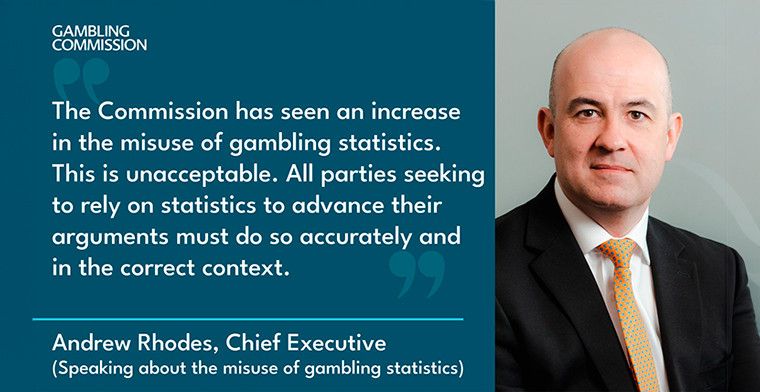UK Gambling Commission Head warn about misusing statistics with no proper context
2 minutos de lectura
(United Kingdom).- Andrew Rhodes, Chief Executive of the UK Gambling Commission (UKGC), has published an open letter, warning stakeholders of the “misrepresentation of gambling statistics”.

Andrew Rhodes, Chief Executive at the Gambling Commission has published an open letter raising concerns about the recent increase in the misuse of these statistics from gambling operators, trade bodies, charities, media outlets, sporting venue owners and others.
Andrew Rhodes commented that there is a continuing robust and often contentious debate around gambling reform at the moment, but it's unacceptable for people to press their arguments by misusing statistics or not setting things in the proper context. “This has been a growing problem in recent months, hence my open letter on the topic today”, he wrote.
The open letter as follows:
Gambling is an issue that can divide opinion, and this has been especially true during the development of the Government’s White Paper, as various people and groups have sought to influence, to express opinion and to present their arguments.
There are a wide range of opinions on the subject and they sometimes differ very greatly and can be equally strongly held. Sometimes this can boil over into personal comments and even conspiracy theories as to what a given group, organisation or individual is believed to be seeking.
Everyone has the right to put forward their argument or opinion and there has been little shortage of that in recent times. It is not for the Gambling Commission to attempt to referee all points in a debate – we would be highly unlikely to succeed - and it would not be a good use of resources.
However, much as everyone is entitled to present their arguments, what is wholly unacceptable is the misuse of statistics to support that argument.
The Commission is very concerned at the significant increase in the misuse of statistics around gambling as different parties seek to make persuasive arguments for or against different proposals.
The Commission has seen misuse of statistics from gambling operators, trade bodies, charities, media outlets, sporting venue owners and others. The Commission has even received (or has been copied into) complaints about the misuse of statistics by another party, where the complainant themselves has misused statistics in order to press their complaint. Others have sought to rely on data which the authors have said is not reliable enough to draw those conclusions.
This is unacceptable. All parties seeking to rely on statistics to advance their arguments must do so accurately and in the correct context.
Where Official Statistics have been used inaccurately, the Commission will generally assume the misuse was accidental and ask the party to correct the record. If the party fails to do so, or declines, then we will consider referring the matter to the Office for Statistics Regulation (OSR)(opens in new tab). Something we have done recently. The Commission also reserves the right to publicly challenge the misuse of statistics by any party, if they fail to correct their misstatement.
The most common misuse of statistics in recent months has been regarding the rate of problem gambling in Great Britain, and the conflation of problem gambling and gambling-related harm.
Problem gambling and gambling-related harm are two separate, but linked, experiences.
The term ‘Problem gambling’ means gambling to a degree that compromises, disrupts or damages family, personal or recreational pursuits. It can be measured by a number of screening tools; the Commission predominantly uses the PGSI (Problem Gambling Severity Index).
When we talk about gambling-related harms, we are talking about the adverse impacts from gambling on the health and wellbeing of individuals, families, communities and society. These harms impact on people’s resources, relationships and health. Harms can be experienced not just by gamblers themselves. There is no single, recognised measure of gambling-related harms, however the Commission has been developing new survey questions that will give us a far better understanding of this issue. These will be included in the forthcoming Gambling Survey for Great Britain, alongside the PGSI.
Multiple individuals and organisations have misused problem gambling statistics to create an inaccurate picture. For example, it has been stated that '99.7 percent of people who gamble do so without being harmed’ and variations on this theme such as arguing that ‘only 0.3 percent of gamblers are harmed’. This is not true and misrepresents the statistics.
The 0.3 percent figure typically relates to the Gambling Commission short form PGSI screen, which is a shorter version, as the name suggests, of the longer PGSI screen. Between March 2019 and March 2023, this screen has produced a range of between 0.2 percent and 0.6 percent of the those aged 16 or older in the population experiencing problem gambling.
This is a percentage of the whole adult population in Great Britain and not of solely those who gamble as many have tried to suggest.
Data from the Health Survey for England 2021 (opens in new tab) shows that of people aged 16 and over who have gambled in the past 12 months, 0.8 percent were experiencing problem gambling according to either the full PGSI or DSM-IV (Diagnostic and Statistical Manual of Mental Disorders, 4th Edition).
Some have also sought to argue the 0.3 percent figure represents those ‘at risk’ from gambling harm. This is again inaccurate and misleading. Firstly, this conflates problem gambling and gambling-related harm. Secondly, the same Health Survey for England 2021 (opens in new tab) indicated that 1.2 percent of people who gambled in the last 12 months were classed as being at a moderate risk of experiencing problems with their gambling leading to some negative consequences, with a further 4 percent being at low risk (gamblers who experience a low level of problems with their gambling with few or no identified negative consequences).
Some have sought to argue that certain types of gambling, such as betting on certain sports, are ‘less risky’ and therefore must have a problem gambling rate lower than the national picture. This is also not true and is misleading.
When referring to problem gambling statistics by product or activity, we have to start with the problem gambling rate amongst people who have gambled in the past year, which according to the Health Survey for England is 0.8 percent (HSE 2021 Gambling tables - table 8) (opens in new tab). However, this headline statistic itself masks a lot of nuances within gambling.
We know that problem gambling rates vary by activity from 0.9 percent of those playing the National Lottery, to 2.8 percent of those betting on horse racing (not online) and 8.5 percent of those who participate in online gambling on slots, casino or bingo (Health Survey for England 2018 - table 16) (opens in new tab). This is why the Government’s White Paper is particularly focussed on these higher risk areas. However of course, it is not only the type of activity that a consumer is taking part in that is important in helping to determine risk but also how many gambling activities they are taking part in, as those whose partake in more activities are more likely to be experiencing problem gambling (HSE 2021 Gambling tables - table 9) (opens in new tab).
A further issue the Commission has observed is where some have sought to compare statistics to argue things have moved in one direction or another. This, at face value, is not an unreasonable thing to do, indeed the Commission publishes trend data from a number of its surveys. However, we have seen examples of comparisons being made where report authors have made clear that reports cannot be validly compared due to limitations, often related to data collection issues due to the Covid-19 pandemic or changes made to survey methodologies.
Anyone seeking to compare data sets has an obligation to make sure the data is used in the proper context and not compared when it is not appropriate to do so, especially when authors have placed those caveats on their reports.
What is clear from the statistics is that the problem gambling rate overall is low, compared to the level of participation, but when we go beneath the surface of those numbers the picture is more complicated and requires statistics to be properly understood and properly used when discussing these matters. Even with a relatively low proportion of people experiencing problem gambling we must remember that this can and does have catastrophic consequences and equates to hundreds of thousands of people directly affected and a greater number amongst friends, families and others.
The debate around gambling is often a fierce one, but nobody is well-served by statistics being misused to further an argument. I therefore ask anyone commenting on this area to take a greater degree of care to ensure they are using evidence and statistics correctly, accurately and in the proper context and with any necessary caveats applied.
Andrew Rhodes
Chief Executive, Gambling Commission
Categoría:Legislation
Tags: Sin tags
País: United Kingdom
Región: EMEA
Event
ICE Barcelona 2026
19 de January 2026
Darío Zutel talks all about Win Systems' presence at ICE Barcelona 2026
(Barcelona, SoloAzar Exclusive).- Darío Zutel, Executive Chairman of Win Systems, reviews the results achieved at ICE Barcelona 2026, highlights the strategic quality of the contacts generated, the momentum of cashless solutions with WIN PAY, and outlines the company's innovation and expansion plans across the Americas, Europe, and other key international markets.
Monday 09 Feb 2026 / 12:00
Air Dice at ICE Barcelona 2026: Building Momentum Through Innovation and Strategic Market Expansion
(Barcelona, SoloAzar Exclusive).- In this interview, Erkki Nikunen, Partner & CBDO of Air Dice, reflects on the company’s performance at ICE Barcelona 2026, the strong reception of its FateQuest series, key industry trends shaping the sector, and Air Dice’s strategic priorities for growth, partnerships, and market expansion in 2026.
Monday 09 Feb 2026 / 12:00
Merkur Group Shines in Barcelona with Triple ICE Triumph
(Espelkamp/Barcelona).- Merkur Group secures three prestigious international accolades for operational excellence, social commitment, and standout exhibition experience.
Friday 06 Feb 2026 / 12:00
SUSCRIBIRSE
Para suscribirse a nuestro newsletter, complete sus datos
Reciba todo el contenido más reciente en su correo electrónico varias veces al mes.



















